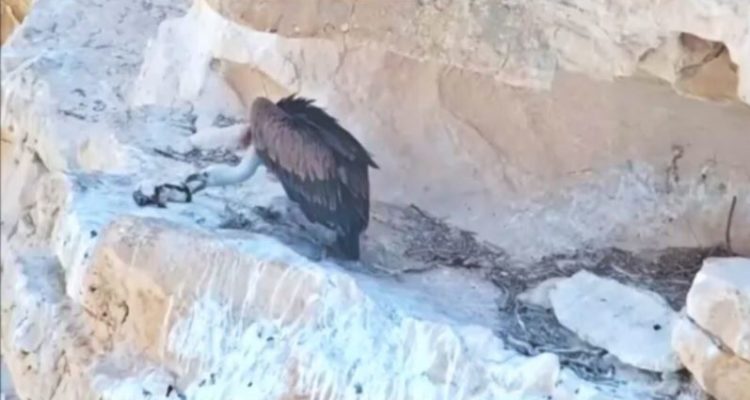Xtend drone company, the Israeli army and conservationists join forces to bring food to an orphaned chick on an isolated cliff.
By Brian Blum, ISRAEL21c
An endangered vulture chick stranded on a cliff ledge in the Judean desert became the unlikely poster child for the Israeli drone industry.
Griffon vultures are monogamous and increasingly rare. Hundreds of pairs could be found in the skies over Israel until the 1950s. Today, fewer than 60 pairs remain.
So, when a chick was born in February to the happy pair K74 (female) andT49 (male), conservationists were overjoyed.
Mother, father and baby were monitored by Israel Raptor Nest Cam in a project coordinated by the Israeli Nature Parks Authority and the Israel Ornithological Center of the Society for the Protection of Nature in Israel.
All seemed to be going well, with both parents bringing food to the chick until it was able to hunt by itself.
Then disaster struck.
In June, K74 flew into a power line and was electrocuted. The suddenly single dad, T49, was not able to care for his offspring alone.
At first, conservationists thought about sending a human climber to take the chick into captivity – not an ideal situation, but at least it would be fed properly and have a chance to survive.
Then another option was suggested. What if carrion could be sent to the chick – by drone? That would allow the chick to continue to live in the wild until it was old enough to fly.
But the chick’s location on an isolated cliff was difficult to reach. Standard drones, flown by joystick, would most likely crash before delivering their payload.
Israeli startup Xtend came to the rescue.
Xtend’s software and hardware allows drone operators to don a pair of virtual reality goggles so they can see what the drone sees in 3D. The operator then controls the drone by pointing.
“You move your finger like a laser pointer and the drone moves,” Matteo Shapiro, Xtend’s chief experience officer, told ISRAEL21c last year. “If you point at the end of a tree, the drone knows you’re pointing to the edge of that tree.”
That’s a far cry from most commercial drones, which Shapiro told us “have a basic ability to go up and down, left and right. The movement is not terribly accurate. It’s mainly to take photos.”
Baby gets its food
Xtend was already working with the Israel Defense Forces’ Yahalom combat engineering corps, which is responsible for explosives removal.
The conservationists contacted the army and asked if they could pilot a drone to drop food for the vulture chick.
Volunteers from the Yahalom unit prepared for the mission by making a mock-up of the nest site on an IDF base and conducting several practice flights. When they were confident it would work, a “Mama” drone, powered by Xtend’s Wolverine platform, made the delivery.
It worked. The chick received the carrion it needed. And the father vulture was not scared off by the drone, as can happen. (Drones are often used as a kind of scarecrow.)
Mama drone kept up her delivery routine every two to three days for the next month until, by the end of July, the little vulture was old enough to fly and hunt for food. It is now thriving in the wild.
Which is good news for bird lovers, since vultures in Israel have been at risk from not only accidents with power lines but deliberate poisoning by farmers trying to protect their livestock from predators. A mass poisoning in May 2019 killed eight vultures, wiping out nearly half their population in the Golan Heights. In 1998, some 40 vultures were found dead after eating the carcasses of poisoned cattle or wild animals.
When asked if he ever imagined his company’s technology would be used to save an endangered vulture, CEO Aviv Shapiro told ITV’s News at 10 that it was “a use case we never thought about. When you open a company, you build something for a certain market. You don’t think about all the possibilities you might find.”
Homeland and civil security
Xtend caught ISRAEL21c’s attention in 2019 when the company proposed a solution to the “fire-kite” incendiary devices being flown from the Gaza Strip into Israel on kites and balloons.
Xtend’s cofounders, Matteo Shapiro and his brother Aviv, originally conceived the idea for their VR goggles as a way to commercialize “drone racing,” a niche sport where participants race UAVs against each other at speeds of up to 200 miles an hour.
They quickly realized that homeland security could benefit from the same approach. “This is where the biggest gap exists, one that can be well identified and solved,” Matteo told ISRAEL21c last year.
The IDF has since become Xtend’s largest client; you can see in this video how Xtend’s Skylord system shoots down enemy drones.
Xtend recently added civil security to its possible use cases. If a commercial or residential facility has an active break-in, an Xtend VR-piloted drone, located in an on-site “nest,” can quickly get to the location to confront the intruder.
“Not that many people will continue with a burglary if a drone is shouting at them and flashing lights,” Shapira said. The next version, he hinted, may be equipped with tasers to further deter the bad guys.
The Shapiro brothers had previously sold their company Replay Technologies — a system for seamlessly stitching together images taken from high-definition cameras set up around a sports stadium into a 360-degree immersive views for home viewers — to Intel in 2016 for $175 million.





